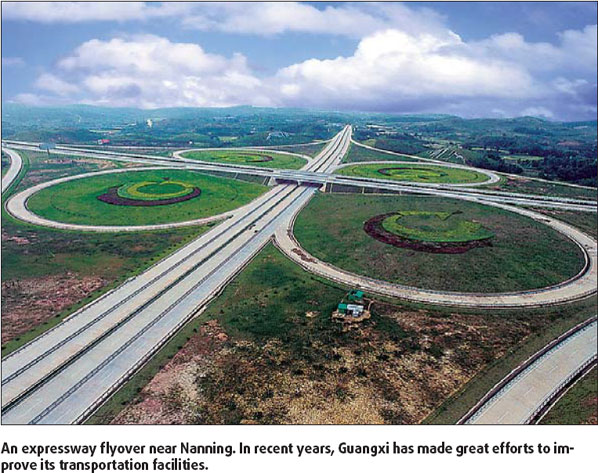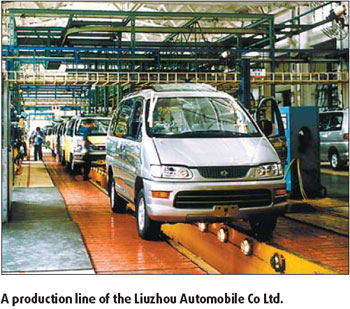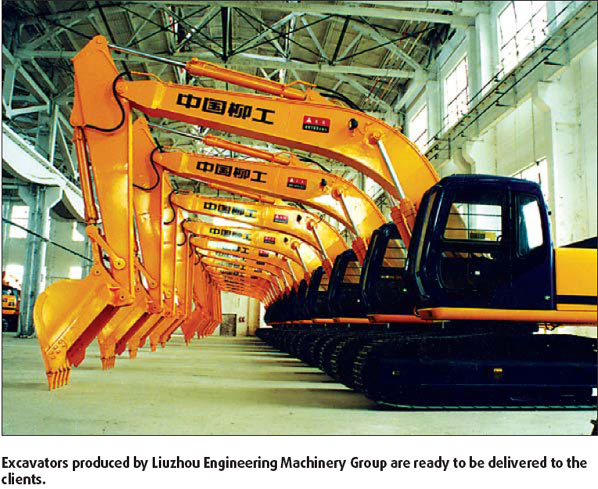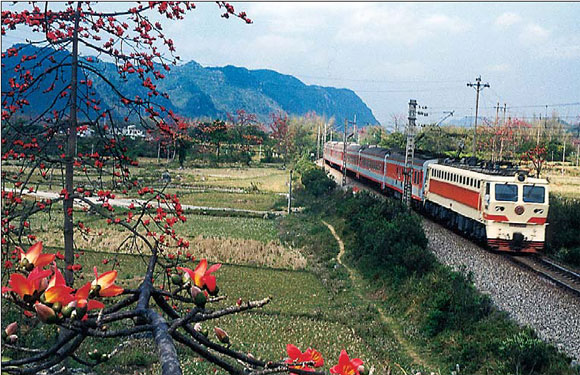Guangxi poised as investment hotspot
|
The Nanning-Hanoi Railway is a major transportation channel linking China and Vietnam. |
Benefiting from closer economic ties between China and the Association of Southeast Asian Nations (ASEAN), the Guangxi Zhuang Autonomous Region is fast becoming a hot investment destination in South China.
Guangxi neighbors Vietnam and faces the Philippines, Malaysia, Indonesia and Singapore across the South China Sea.
Since the First China-ASEAN Expo, held in Guangxi's capital Nanning four years ago, China and the 10 ASEAN countries have stepped up efforts to build the China-ASEAN free trade area. Last year, Guangxi proposed the launch of the Pan-Beibu Bay Cooperation Strategy. All of these have inspired fresh business opportunities for the autonomous region.
At the same time, businesses in the booming Pearl River Delta are shifting their operations to neighboring regions, including Guangxi, making the autonomous region an important investment destination for investors from Guangdong, the Hong Kong and Macao special administrative regions, and Taiwan Province, as well as the rest of the country and the world.
During the first nine months of this year, 1,999 projects were signed between Guangxi and domestic investors outside the region, involving a combined investment of 147.34 billion yuan. A total of 4,049 projects funded by domestic businesses outside the region (including 1,925 newly signed projects) are now under construction.
During the first eight months of 2007, the autonomous region approved 196 foreign-funded projects, an increase of 7.7 percent year-on-year. The pledged investment of these projects was $1.14 billion, up 67 percent from the same period last year.
With the investment environment improving in Guangxi, businesses from 72 countries and regions have established nearly 10,000 enterprises there, with a total contractual investment of $18.1 billion, making Guangxi one of the leading overseas investment destinations in the central and western regions of China.

Major investment sources
Hong Kong and Macao special administrative regions and Taiwan Province are the major sources of overseas investment for Guangxi.
By July 2007, the number of enterprises in the autonomous region invested by businesses from Hong Kong and Macao reached 6,279, with a total contractual investment of $9.74 billion. The number of Taiwanese-funded enterprises was 1,104, with a total contractual investment of $1.24 billion.
Famous companies from the three regions, such as Taiwan Cement Corp and China Resources (Hong Kong) have established a number of large investment projects in Guangxi.
For instance, in April 2006, Taiwan Cement Corp launched a large cement production facility in Guigang in Guangxi. Involving a total investment of 3.5 billion yuan and consisting of four cement production lines each with a daily output of 600 tons, this is the largest Taiwanese-invested project in Guangxi to date.
China Resources (Hong Kong) has also established cement production projects in Nanning and Guigang, with a combined investment of $400 million.
Such achievements can be attributed to the close relations between Guangxi and the three regions.
Close relations

As early as January 2005, Edmund Ho Hau Wah, head of the government of Macao Special Administrative Region, led a delegation to Guangxi. During the visit, businesses from the two sides signed agreements to launch 150 cooperative projects.
In August of the same year, Guangxi held two large-scale investment promotion events - the Guangxi Week in Hong Kong and Guangxi Week in Macao - to promote its investment environment. Twenty-three cooperation agreements, involving a total investment of $200 million, were signed during the events.
In April 2006, Guangxi held a large-scale promotional fair in Hong Kong to promote the third China-ASEAN Expo and Guangxi's investment opportunities. About 300 Hong Kong officials and businesspeople attended the fair.
In June 2006, Donald Tsang Yam Kuen, head of government of the Hong Kong Special Administrative Region, headed a delegation consisting of representatives of more than 80 Hong Kong enterprises to Guangxi, where they attended the Guangxi-Hong Kong Economic Cooperation Fair.
During the visit, Hong Kong Trade Development Council signed with Guangxi Commerce Bureau and Guangxi Investment Promotion Bureau an agreement to promote Guangxi-Hong Kong economic and trade cooperation in the framework of Closer Economic Partnership Arrangements (CEPA). Hong Kong's entrepreneurs showed strong willingness to invest in the manufacturing, automobile parts, traditional Chinese medicine production, food processing, cosmetics and forestry industries in Guangxi.
In order to promote economic cooperation with Taiwan, Guangxi has held the Guangxi-Taiwan Economic and Trade Cooperation Fair every year since 2005. The three sessions of the fair held so far have witnessed the signing of 155 cooperation projects, with a combined investment of $2.6 billion.
Grasping the opportunities thrown up by flourishing China-ASEAN economic cooperation, and buoyed by its own resource advantages, Guangxi will give priority to the development of such sectors as port development, aluminum metallurgy, papermaking, sugar production, steel and iron, chemicals, non-ferrous metal production, food processing, building materials production and pharmaceuticals. These will also be preferred fields for overseas and domestic investment in the years to come.

(China Daily 10/30/2007 page19)









